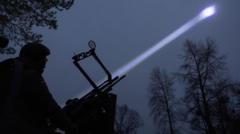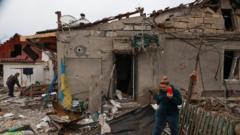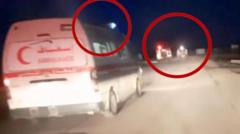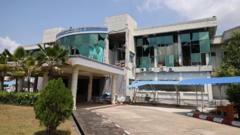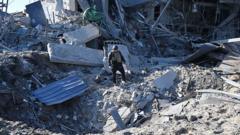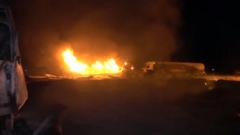As Gaza’s Civil Defence workers face unimaginable losses in the line of duty, they battle trauma while trying to recover thousands believed buried under rubble. Their sacrifices remain largely unacknowledged, even as they define heroism through their dedication to saving others.
The Strain of Resilience: Gaza's Rescue Workers Grapple with Trauma and Loss
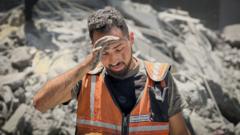
The Strain of Resilience: Gaza's Rescue Workers Grapple with Trauma and Loss
Amidst the rubble and grief, Gaza's Civil Defence workers continue their harrowing mission, struggling with psychological toll and acute lack of resources.
Empty line 4
The rescue operations in Gaza are underscored by tragedy and trauma, as workers from the Civil Defence struggle to recover victims amidst devastating destruction. Abdullah al-Majdalawi, a young rescue worker, poignantly stated, "I have become afraid of my own memories," highlighting the psychological toll this work inflicts.
With over 99 Civil Defence personnel killed and hundreds more injured during the ongoing Israeli bombardment, the agency's tasks have become even more heart-wrenching. Workers like Nooh al-Shaghnobi lay the recognizable orange vests of their fallen colleagues over their coffins, symbolizing their dedication and sacrifice in the rescue efforts.
The human cost of the conflict is staggering, with reports of over 47,000 Palestinian casualties during the struggle, predominantly affecting women and children. As the battle continues, the Civil Defence has identified more than 10,000 individuals buried beneath the wreckage—a grim task that weighs heavily on their shoulders. Their efforts aren’t just operational; they are deeply personal, often entwined with the loss of their compatriots.
Al-Shaghnobi describes one poignant recovery that underscores the emotional pain on the ground, mentioning a case where he located the remains of three lost individuals beneath collapsed structures. This type of appearance of familiar tragedies compounds the grief each worker carries as they witness devastation day by day.
Despite their heroism being heralded externally, those within the Civil Defence struggle with a profound sense of isolation. Mohammed Lafi noted the lack of psychological support: "None of us have been offered counselling… but we all need this.” They confront traumas alone, often unimaginable to those outside Gaza.
While they work tirelessly to recover the deceased, the Civil Defence faces challenges, including insufficient equipment and support. Mahmoud Basal conveyed the harsh reality, stating they are working with inadequate tools and hoping to recover the remaining bodies within the next 100 days—an ambitious goal considering the circumstances.
The distribution of remains has become a critical issue, as families desperately seek closure. The community is filled with anguish as they search through the fragments of their loved ones, hoping for recognition amid horror. One father grieves for his son, insisting he would know him in any state, while another mother describes her futile search for her lost child.
The emotional and physical burden on Gaza’s Civil Defence is immense, with the agency acknowledging that many perished without a trace. Yet there’s a determination within these workers—they remain committed to locating the dead and honoring their memories. "This work awaits us. All we need is the equipment," Al-Shaghnobi affirmed.
As they navigate a landscape filled with sorrow, the Civil Defence's unwavering dedication exemplifies resilience even amidst their personal battles and traumatic memories.
The rescue operations in Gaza are underscored by tragedy and trauma, as workers from the Civil Defence struggle to recover victims amidst devastating destruction. Abdullah al-Majdalawi, a young rescue worker, poignantly stated, "I have become afraid of my own memories," highlighting the psychological toll this work inflicts.
With over 99 Civil Defence personnel killed and hundreds more injured during the ongoing Israeli bombardment, the agency's tasks have become even more heart-wrenching. Workers like Nooh al-Shaghnobi lay the recognizable orange vests of their fallen colleagues over their coffins, symbolizing their dedication and sacrifice in the rescue efforts.
The human cost of the conflict is staggering, with reports of over 47,000 Palestinian casualties during the struggle, predominantly affecting women and children. As the battle continues, the Civil Defence has identified more than 10,000 individuals buried beneath the wreckage—a grim task that weighs heavily on their shoulders. Their efforts aren’t just operational; they are deeply personal, often entwined with the loss of their compatriots.
Al-Shaghnobi describes one poignant recovery that underscores the emotional pain on the ground, mentioning a case where he located the remains of three lost individuals beneath collapsed structures. This type of appearance of familiar tragedies compounds the grief each worker carries as they witness devastation day by day.
Despite their heroism being heralded externally, those within the Civil Defence struggle with a profound sense of isolation. Mohammed Lafi noted the lack of psychological support: "None of us have been offered counselling… but we all need this.” They confront traumas alone, often unimaginable to those outside Gaza.
While they work tirelessly to recover the deceased, the Civil Defence faces challenges, including insufficient equipment and support. Mahmoud Basal conveyed the harsh reality, stating they are working with inadequate tools and hoping to recover the remaining bodies within the next 100 days—an ambitious goal considering the circumstances.
The distribution of remains has become a critical issue, as families desperately seek closure. The community is filled with anguish as they search through the fragments of their loved ones, hoping for recognition amid horror. One father grieves for his son, insisting he would know him in any state, while another mother describes her futile search for her lost child.
The emotional and physical burden on Gaza’s Civil Defence is immense, with the agency acknowledging that many perished without a trace. Yet there’s a determination within these workers—they remain committed to locating the dead and honoring their memories. "This work awaits us. All we need is the equipment," Al-Shaghnobi affirmed.
As they navigate a landscape filled with sorrow, the Civil Defence's unwavering dedication exemplifies resilience even amidst their personal battles and traumatic memories.


